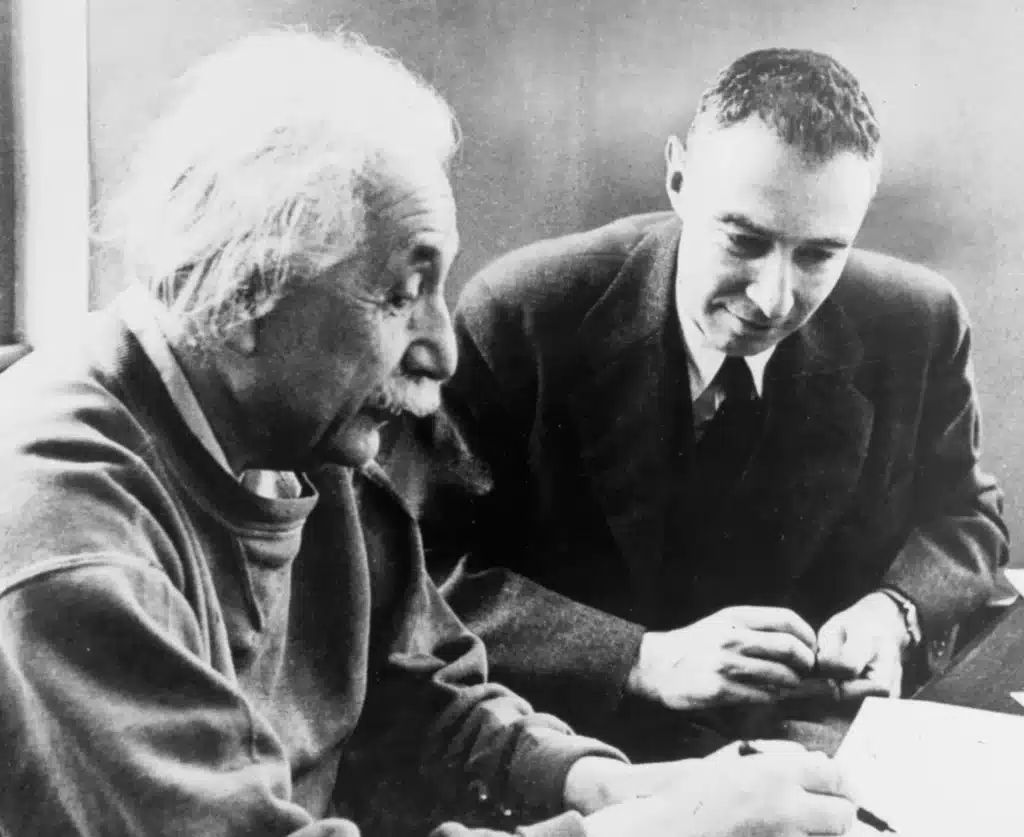Have you seen Oppenheimer by now? If so, you probably have realized it’s more than just a story about the creation of the atomic bomb. It’s a story of regret, of internal conflict, of how a bunch of Jews used their brilliant minds to change the world — for better or worse.
J. Robert Oppenheimer was born in 1904 to German Jewish parents in Manhattan. The Oppenheimer family was not religious and never attended temple. In fact, they rejected religion in general. Oppenheimer often told people he was not German nor Jewish, most likely to avoid being associated with two groups that would have him wrongly judged at that time.
Still, anti-semitism followed him wherever he went. While attending Harvard in the 20s, other students avoided him and he hung out largely with other Jewish students. While teaching at Berkeley, Oppenheimer’s request to secure a position for his Jewish colleague was denied, with the department head saying: “One Jew in the department is enough.”
In the 1930s, Oppenheimer was no longer able to ignore all of the antisemitism around him. As he saw all of his friends, family, and colleagues suffering at the hand of Nazism, the brilliant mind admitted he had a “continuing, smoldering fury” about the treatment of Jews in Germany.

Oppenheimer not only rescued family members but used a percentage of his salary to help Jewish scientists escape Germany. It was actually his anger at Nazi Germany that drove him to direct the Manhattan Project to begin with. And other Jewish scientists joined him.
Six of the eight leaders working on the atomic bomb were Jewish — and other technicians and scientists working in New Mexico with them were also Jewish. This includes refugees from Europe. It was antisemitism and a sense of brotherhood that truly drove the Manhattan Project forward. It was a hunger to see Nazi Germany’s downfall. It was hope for a better future for Jews and other minorities.
So why is Oppenheimer played by Cillian Murphy, a self-proclaimed aethiest who grew up Catholic, instead of a Jewish actor?

Oppenheimer: Jewish, Cillian Murphy: Not Jewish… Meh?
During a time when Disney is being called “woke” for casting a talented black woman to play a mermaid and Barbie is demanding the fall of the patriarchy, why are Jews still overlooked when it comes to playing Jewish characters, fictional and non-fictional alike?
Comedian David Baddiel told Sky News: “Another day, another film/TV show/play in which a famous Jew is played by a non-Jew. I have talked and written about this many times — about how it’s a question not of acting but of context: minority casting being presently dominated by the notion of authenticity. The question is why that doesn’t apply to Jews, and what that means for how people see Jews — so I shan’t rehearse it again.”
This topic was also in the headlines when The Marvelous Mrs. Maisel was in its prime. The show — which centers around Midge’s dreams of being a female comedian during a time when her sharp wit and biting insults were unheard of — is basically entirely made up of Jewish characters. When people found out that the titular character was played by a non-Jewish actor named Rachel Brosnahan, it brought up a lot of concern.

Wrote the Broad Street Review: “I don’t understand why casting directors still feel they can get away with subbing in anyone rather than insisting on representation and employing Jewish performers. We don’t accept yellowface Mikados or blackface Othellos (don’t get me started on Ken Ludwig’s Lend Me a Tenor). Why are we still okay with absenting Jews from our own stories?”
While the question was not meant to be answered, I have two anyway. The first is that Jewish people are not often treated the same as other minority groups. We often blend in with white people and are sometimes seen as privileged for this. We are stereotyped as being rich and good with money, as having high-paying, high-power jobs — even controlling the media and other industries. For this, we are not often viewed the same as other minorities by either side. White people don’t feel the need to please us or act concerned for us.
The second reason is that Jewish people — especially women — are said to not meet the traditional beauty standards, something that may be subconscious or purposeful depending on the specific situation. Jewish people make up the majority of people getting nose jobs at some offices since we are made to feel like our noses aren’t the right shape or size. And while that’s changing thanks to social media and the younger generation, television is often very old school when it comes to beauty.
Speaking Of Noses…
The most recent Hollywood shenanigans revolve around yet another Jewish figure being represented in a movie by a non-Jewish actor. This time, with a huge, fake nose.
Bradley Cooper has faced some backlash — but not nearly enough — for wearing a prosthetic nose for his role as conductor Leonard Bernstein in the upcoming movie Maestro. Again, why is Bernstein — a real Jewish guy — not being portrayed by a Jewish actor? Looking at the old pictures of Bernstein, he looks exactly like almost every guy I’ve gone on a date with on Hinge when I had it filtered to Jewish men only.
Is it really necessary to take a non-Jewish guy and hire someone to create exaggerated Jewish features on him? Seems silly to go that out of the way to avoid using a real Jewish actor, almost intentional.

While some people are calling it “Jewface,” a disturbingly large amount of people are saying it’s an overreaction to care about a nose in a movie. There are bigger things to worry about, they say. Bigger than Cooper’s fake nose? I doubt it. But all jokes aside, this is just one example of microaggressions towards Jews being looked over when all other minority groups would be acknowledged with their horror over a different race portraying them in a film.
While Bernstein’s own children have shrugged it off, the overall concern about Jewish figures being portrayed by non-Jewish actors remains, along with all the reasons why it’s just one of many microaggressions against Jews that adds up to the nonchalant attitude people feel about antisemitism in the United States.
No matter the reason, or reasons, it’s clear that movies and TV shows are fine telling Jewish stories without Jewish people there. Oppenheimer is just a recent example but it’s far from the only one. But a real Jewish man from history being portrayed by a non-Jewish actor? Interesting how this got very little (basically no) backlash from anyone, Jews included.
Maybe it’s because it’s a non-issue to some. There are more concerning things happening when it comes to antisemitism — some things quite dangerous. Sure. But does that mean we should let micro-aggressions continue without any discussion? No, if you ask me.
Was I seething in anger while watching Oppenheimer, huffing and puffing that he wasn’t played by a Jewish actor? Nah. I still don’t feel much about it. But maybe that’s the problem.
